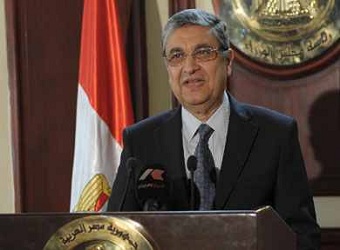Egypt is in talks with Saudi Arabia for an electricity interconnection project at a total investment cost of $1.56 billion and with a 3000 megawatt capacity, Electricity Minister Mohamed Shaker said at an Al-Ahram energy conference.
The project is set to be operational by 2021, Shaker said.
Contracts with Gulf Cooperation Council Countries regarding electricity interconnection will be signed in April.
The electricity ministry is focusing on the strengthening of Egypt’s electricity grid to allow for the import and export of electricity through interconnection projects, the minister said.
“The more we increase and strengthen our networks, the more we can increase the electricity linkage [with other countries],” said Shaker.
Egypt is linked with Jordan with a 450 MW line, and with Libya through a 200 MW line.
Egypt has also been in negotiations with Cyprus and Greece over a number of energy projects.
A memorandum of understanding was signed for electricity interconnection between Egypt, Cyprus and Greece, for a 3000 MW capacity line, Shaker said.
Egypt is also in negotiations to sign an agreement to establish a maritime pipeline to transport gas from Aphrodite gas field to Egypt, Petroleum Minister Tarek El-Molla said at the conference.
Shaker presented a number of major electricity projects Egypt is working on with foreign partners.
Egypt is cooperating with Chinese company State Grid to implement a super voltage network with 500 kW capacity over a total of 1,210 kilometres, the electricity minister said.
The capacity of State Grid’s network will reach 1,500 kW in the second phase.
Egypt signed a memorandum of understanding with the Beijing-based Global Energy Interconnection Development and Cooperation Organization (GEIDCO), an association that focuses on promoting sustainable development of energy, in August 2017.
Siemens project to save $1-1.3 bln
The Siemens project will save $1-1.3 billion as a result of the energy efficiency of the three 4.8 GW combined cycle power plants, Shaker said at the event.
By mid-2018, electricity worth 14.4 GW will be added to the grid from the Siemens power plants.
Shaker said the ministry has managed to close the gap between electricity demand and consumption, along with foreign partners, following the peaking of the gap in 2014.
The projected addition to the electricity grid is currently above demand, but it will adjust in the coming years to international standards, Shaker said.
Egypt has 90,000 MW wind energy capacity from land allocation
Egypt has a 90,000 MW wind energy capacity from the land currently allocated to wind energy production, Shaker said.
On solar energy, he said the combined cycle energy produced so far from solar energy is 232 MW and 750 MW from wind energy.
Shaker also spoke about the Benban solar power complex, set to produce 2,000 MW, the biggest amount of solar energy produced from one location, the minister said.
The 22/22/220 kv linkage station at Benban solar complex was completed, even before the completion of the power-generating stations.
The complex is set to produce 2000 MW in wind energy, the biggest wind energy produced from one place.
A total of 32 agreements were signed with private sector companies for renewable energy projects as part of the feed-in tariff programme, Shaker said.
Egypt is also working on a project to produce energy using the technology of pumping and storing solar energy with 2400 MW capacity, according to the minister.
Separately, three foreign consortia are working on a clean coal project worth $5.5-6 billion, to be implemented within five to six years, he announced.
Contracts are set to be signed in May-June 2018, Shaker added.
Electricity from Dabaa ‘cheaper in the long–term’ than the Siemens plants
Generating electricity from nuclear power is cheaper on the long-term than from the Siemens plants, Shaker also said.
The Dabaa nuclear power plant will produce 1,200 MW from each of its four reactors and has a 60-year operational age.
Russia will loan Egypt $25 billion to finance the nuclear power plant, the country’s first.
However, by the end of the operational age of the plant, investments on Siemens will have cost 193 percent more than what was spent on nuclear power investments, due to the cost of natural gas, Shaker said.
The minister explained that electricity prices depend not just on capital investments, but also on the price of fuel to generate electricity.
Nuclear power as fuel for electricity is much cheaper than using natural gas as fuel; by 2024/25, fuel from natural gas pipelines will cost $8.4 per million British thermal unit (BTU), fuel from LNG will cost $12.4 per million BTU, while from nuclear energy it will cost $0.84 per million BTU.
In other words, the investment cost is higher for nuclear investments than from the Siemens plants, but the cost of getting electricity from the gas-fired plants will be much higher, making the long-term spending on electricity generation from Dabaa nuclear plant more cost-effective.
Source: Ahram online
